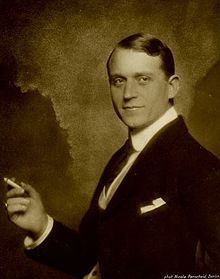Nils Chrisander

Nils Chrisander , born Nils Valdemar Chrisander , Nils Waldemar Chrisander or Waldemar Olaf Chrisander (* 14. February 1884 in Stockholm , Sweden ; † 5. June 1947 in Skivarp at Skurup , Sweden) was a Sweden, Germany and the United States active Swedish Actor and film director .
Live and act
According to his own account, Chrisander's uncle was the composer of the same name, Nils Chrisander, and his great-aunt was the opera singer Jenny Lind . He claims to have attended various high schools in Stockholm, Vienna , Paris and London . After graduating from school, he is said to have started studying art history and philosophy at the beginning of the 20th century . Then he tried his hand at painting.
At the Elevenschule the Dramaten in Stockholm Chrisander took acting lessons and then began Theater (among others in August Strindberg -Stück Karl XII. ) To play. Chrisander got in touch with cinematography through actor and director Bjørn Bjørnson in 1913.
His first detectable film character, a supporting role, was that of the engineer Markander in Et Gensyn in 1914 . In the following year Chrisander moved to Berlin , where he almost exclusively received leading roles. From then on, Chrisander's subject was heroes, lovers and character roles. In the same year, 1915, he received his best-known part from his early career in Germany in Ernst Matray's supposedly first film adaptation of Gaston Leroux's romantic horror story The Phantom of the Opera , in which he played the title character alongside his Norwegian colleague Aud Egede-Nissen . Other top partners in German film in the coming war and early post-war years were Erna Morena , Lotte Neumann , Henny Porten , Lil Dagover and Pola Negri .
Time and again Nils Chrisander returned to his native Stockholm for film engagements. In 1918 he made his last Swedish appearance there with the main role of the surgeon Dr. Henry Arel in Nobel Pristagars . The majority of his Swedish films were made under the direction of Georg af Klercker. His favorite role in Germany was that of Prince Hochwald in his own production The White Roses of Ravensburg - a film for which he (together with a co-author) also wrote the script.
Since the last year of the war in 1918, Nils Chrisander worked intensively as a film director in Berlin for two years. However, none of these works is of film historical importance. At the beginning of the 20s, Chrisander left the film business temporarily and went on trips, among other things to "secret studies in Egypt and Asia " , as he wrote nebulously. Back in Germany, he can be traced back to Berlin-Friedenau until 1926 , then in the same year Chrisander followed a call to Hollywood , where in the spring of 1927 two little-noticed productions by the Swede with the actor Lya de Putti, who was once active in Austria and Germany , Joseph Schildkraut and Victor Varconi were premiered.
Although there were no follow-up offers, there was evidence that Chrisander remained in Los Angeles until at least the early 30s . He later returned to his native Sweden, where he settled in a village in the far south of the country.
Filmography (as an actor)
- 1914: Et Gensyn
- 1915: About a woman
- 1915: The waves are silent
- 1916: The Phantom of the Opera
- 1916: amaranth
- 1916: Paths that lead into the dark
- 1916: Love, it was just a dream
- 1916: The ghost hour
- 1916: Svärmor på vift eller Förbjudna vägar
- 1916: Fången på Karlstens fästning
- 1917: When the sea is clear for German travel
- 1917: Not long did my luck deceive me
- 1917: The dead eyes
- 1917: The new Dalia
- 1917: Revelj
- 1918: Nobel pristagars
- 1919: The white roses of Ravensburg
- 1920: The hunt for death
- 1922/23: The world in flames, two parts
Filmography (as a director)
- 1918: Chrysanthemum
- 1918: Olaf Bernadotte
- 1919: Cagliostro's dead hand
- 1919: Vows of Chastity
- 1919: The death mask
- 1919: tragedy of a passion
- 1919: Mandrake and the Golem
- 1919: The white roses of Ravensburg (also scriptwriter)
- 1920: winner death
- 1922/23: The world in flames, two parts
- 1926: The Sheik's Prisoner (Fighting Love)
- 1927: The Heart Thief
literature
- Hans Richter (ed.): Filmstern 1922 . Hans Hermann Richter Verlag, Berlin-Wilmersdorf 1921/22, p. 18
- Kurt Mühsam / Egon Jacobsohn: Lexicon of the film . Lichtbildbühne publishing house, Berlin 1926, p. 32.
Web links
- Nils Chrisander in the Internet Movie Database (English)
- Nils Chrisander at filmportal.de
Remarks
- ↑ according to the Swedish Film Institute
- ↑ according to Hans Richter: Filmstern 1922 , p. 18 and Mühsam / Jacobsohn: Lexikon des Films , p. 32
- ↑ according to IMDB
- ↑ Mühsam / Jacobsohn, p. 32
- ↑ like 4. Das Schwed. Film institute says he also worked as an archaeologist. So he could have participated in excavations at least in Egypt
| personal data | |
|---|---|
| SURNAME | Chrisander, Nils |
| ALTERNATIVE NAMES | Chrisander, Nils Valdemar (maiden name); Chrisander, Nils Waldemar (full name); Chrisander, Waldemar Olaf |
| BRIEF DESCRIPTION | Swedish actor and film director |
| DATE OF BIRTH | February 14, 1884 |
| PLACE OF BIRTH | Stockholm , Sweden |
| DATE OF DEATH | June 5, 1947 |
| Place of death | Skivarp near Skurup , Sweden |